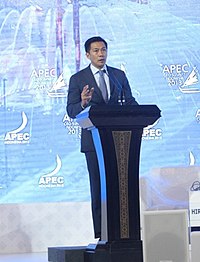
Photo from wikipedia
Authentic leadership is essential for predicting employee resilience. However, despite fruitful findings, more adapted models of authentic leadership – employee resilience based on empirical findings can serve as a guide… Click to show full abstract
Authentic leadership is essential for predicting employee resilience. However, despite fruitful findings, more adapted models of authentic leadership – employee resilience based on empirical findings can serve as a guide to understand the complex mediators and moderators in different industries such as in construction engineering project organizations during the turbulent pandemic. This study, therefore, based on the organizational identification theory and flow theory through the lens of positive organizational psychology, aims to disentangle the authentic leadership—employee resilience association by investigating their underlying mechanism and their boundary condition. To test our hypothetical model, we applied a cross-sectional design with data collected from a large sample of 884 employees from a big enterprise in China. Findings from confirmatory factor analysis, structural equation modeling analysis, and Hayes’s conditional process model indicated that: authentic leadership positively predicted employee resilience through the partial mediation effect of organizational identification, and such a mediation model was moderated by the experience of flow. In other words, flow moderated the relationships between authentic leadership, organizational identification, and employee resilience. Findings provide evidence for cultivating leaders’ authenticity in promoting their subordinates’ resilience; findings also highlight the significance of organizational identification in bridging authentic leadership and employee resilience and the essential role of flow experience in supporting the relationships mentioned above.
Journal Title: Frontiers in Psychology
Year Published: 2022
Link to full text (if available)
Share on Social Media: Sign Up to like & get
recommendations!